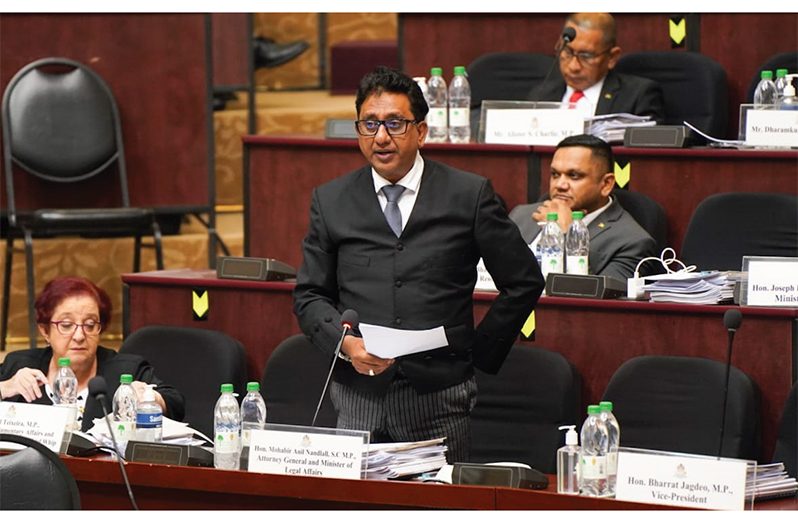–create secure legal environment for foreign investors and businesses operating locally
THE landmark Foreign Judgement (Reciprocal Enforcement) Bill, which will help Guyana recover repayments from international companies if no local assets are available, was passed in the National Assembly on Thursday.
This ground-breaking legislation was presented by the country’s Attorney-General and Minister of Legal Affairs, Anil Nandlall, S.C., in April, and aims to empower Guyana in recovering repayments from international companies when no local assets are available for recourse.
“This was a manifesto promise of our government and since we assumed government in August 2020, our government has been aggressively delivering on this promise. No doubt a modern body of laws and an efficient, competent and impartial legal system are … of a vibrant, thriving and democratic society. This bill is part of that menu of modern laws that are so necessary for economic development and investment, in particular, foreign investment.
“Litigation in any part of the world is expensive, protracted and time-consuming. In the end, every litigant expects the fruits of the litigation not only to be efficacious but also effectively enforceable as far and as wide as possible,” Nandlall said as he read the bill a second time on Thursday.
The bill was backed by the government ministers and members of A Partnership for National Unity (APNU). It was read for the third time and subsequently passed by the National Assembly.
The passage of this bill is expected to revolutionise the landscape of cross-border legal judgments, allowing Guyana to seek recognition and enforcement of foreign judgments with greater efficiency and effectiveness.
The bill applies to some 60 countries including all of the commonwealth countries, every English-speaking Caribbean territory, and other major jurisdictions in the world, including the United States and China.
By repealing the existing Foreign Judgment (Reciprocal Enforcement) Act, Cap 7:04, and the Judgments Extension Ordinance, Cap. 27, this new bill marks a bold step towards aligning the nation’s legal framework with modern global realities.
The driving force behind this legislation was a recent case in which the Attorney-General’s chambers successfully obtained an ex-parte judgment against Trinidadian company, Davis Ecolife Limited.
Based on the ruling, the company has to repay the $6,159,325 deposit it received from the National Data Management Authority (NDMA) in 2019, for the supply of two prefabricated enclosures to house ICT hubs.
The said agreement – made under the former APNU+AFC government– had a completion date of January 25, 2019. However, Davis Ecolife Ltd. failed and/or neglected to perform the contract in accordance with the agreed date.
SIGNIFICANTLY STRENGTHENED
With the new Foreign Judgement (Reciprocal Enforcement) Bill now in place, Guyana’s legal arsenal is significantly strengthened to secure future judgments against international entities that may have previously eluded accountability.
The Bill establishes a legal framework to allow judgments from Guyana to be enforced in another country.
And once that company has assets in that country, Guyana will be able to recover the proceeds of the judgement in the same way as if the company had assets in the country in which the judgement was granted.
The process typically involves submitting a request for recognition of the foreign judgment to a court in the country where enforcement is sought.
This request must demonstrate that the foreign judgment is final and conclusive, was made by a court with proper jurisdiction, and does not violate public policy in the country where enforcement is sought.
If recognition is granted, the foreign judgment can be enforced in accordance with the laws of the country where enforcement is being sought. This may involve taking additional legal steps such as filing a lawsuit, seeking an injunction or seizing assets.
With Guyana’s burgeoning oil and gas sector and the country’s development making the country a more advanced place of business, it has been contended that updating the country’s archaic laws is necessary.
The bill is intended to promote international trade and investment by providing a more secure legal environment for foreign investors and businesses operating in Guyana.
It also reflects Guyana’s commitment to international law and the recognition of foreign judgments.
The bill will have significant effects on the legal system of Guyana, and would even help to attract foreign investment by providing a more predictable and transparent system for investors.



.jpg)









